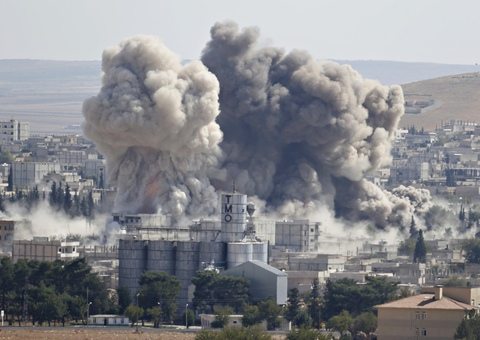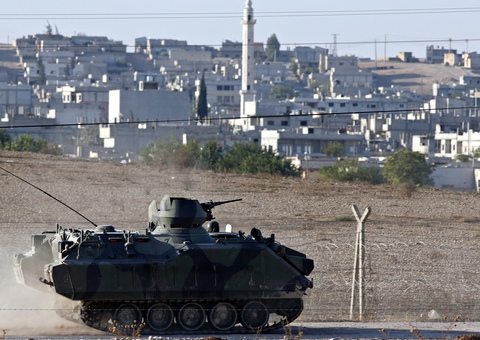The US defence secretary has confirmed “mechanised forces” will be redeployed alongside soldiers to protect oilfields in eastern Syria, in a reversal of Donald Trump’s earlier order to withdraw all troops from the country.
Mark Esper told a press conference at Nato headquarters in Brussels that “we are reinforcing our position” in Syria that “will include some mechanised forces”, although he tried to insist the US mission in the country was unchanged.
The goal, he added, was to deny Isis access to the oilfields in north-east Syria, but he would not say how many US troops would remain other than to indicate the number would be fewer than 1,000.
Minutes earlier, Donald Trump tweeted to explain the importance of securing the oil, as part of his agreement with Turkey, which gave the green light for the Turkish president, Recep Tayyip Erdoğan, to launch an invasion to establish a security zone last month.
Trump wrote: “When these pundit fools who have called the Middle East wrong for 20 years ask what we are getting out of the deal, I simply say, THE OIL, AND WE ARE BRINGING OUR SOLDIERS BACK HOME, ISIS SECURED!”
Esper said the intention was “to strengthen our position at Deir ez-Zor,” most likely at a gas plant, the site of a February 2018 clash between US special forces and Syrian regime-backed militias fighting with Russian mercenaries.
The bulk of the 1,000 US troops who had been deployed in north-east Syria at the beginning of the month would ultimately return home, Esper indicated. “All the other forces would be turned off,” he said.
On Thursday night, as reports of the unexpected redeployment first circulated, Fox News reported that tanks would be used, probably from units already in the Middle East. CNN said it would happen relatively soon.
Esper also said he had been told by Hulusi Akar, the Turkish defence minister, that Turkish forces had “recollected some of the 100” Isis prisoners who had escaped from custody earlier this week.
There were at least 6,000 Isis fighters being held in detention by the Syrian Democratic Forces (SDF) before the invasion, and there have been repeated warnings that they could escape as a result of the chaos from Turkey’s incursion.
The US special envoy for Syria, James Jeffrey, admitted on Wednesday that “a bit more than 100 Isis detainees have escaped” from captivity, although Trump had claimed they were “largely recaptured” the same day.
At the Nato summit on Thursday evening, the German defence minister and CDU party leader, Annegret Kramp-Karrenbauer, proposed there should be greater international involvement in the 18-mile deep (30km) Syrian border security zone being implemented by Turkey and Russia.
However, sources familiar with the discussions said there was surprise that the German plan was so lacking in detail, prompting questions as to whether it would progress much further, particularly given Turkish and Russian control of the area. It was not clear if Germany wanted an international deployment of troops or observers, one person said.
Analysts said the US decision to take control of the oilfields would require a further partition of the country. “It would mean walling off eastern Syria as a US zone,” said Aaron Stein, the director of the Middle East programme at the Foreign Policy Research Institute in Washington.
“You would have to protect it from the air. You have to supply it and then you have got to protect the road, presumably from Iraq. You can easily see a scenario where we end up with more troops in Syria than we started off with.”
Trump added to the confusion on Thursday by tweeting: “Perhaps it is time for the Kurds to start heading to the oil region!”. The remark seemed to endorse a population transfer from the Kurdish areas along the border with Turkey southwards to the almost entirely Sunni Arab area of Deir ez-Zor.
Such a mass displacement of Kurds from their homes would fit with Erdoğan’s plans to resettle north-eastern Syria with Syrian Arab refugees to create a buffer zone against Kurdish insurgents. Kurdish refugees in Turkey are already reported to be subject to forcible deportation.
“The president of the United States is now helping Turkey achieve ethnic cleansing by telling the Kurds to flee their homes,” Samantha Power, a former US ambassador to the UN, said in a comment on Twitter.
Mass demographic changes – carried out at the barrel of a gun – risk prolonging Syria’s multiple-front conflict indefinitely, said Jan Egeland, the head of the Norwegian Refugee Council and the UN’s former humanitarian chief.
“This was an area of relative stability, before all of these deals,” said Egeland, who was also the UN’s special adviser on Syria. “We need to remind all of these people with the power and the guns that this is no chessboard. It is a place where people live.”
Egeland said about 180,000 people, half of them children, had been displaced as a consequence of the Turkish incursion and “explosive, improvised deals”.
“For many, the move will not be voluntary and they will displacing the original population there. No problems will be solved and new problems will be created,” he said.
There was also considerable uncertainty on Thursday over the fate of nearly 70,000 people, almost all women and children, in the al-Hawl camp in north-eastern Syria. Some of them are families of Isis fighters, but many are civilians swept up in formerly Isis-run areas.
The UN’s assistant secretary general for humanitarian affairs, Ursula Mueller, said the situation in the camp was “desperate”. In a warning directed largely to western nations, Mueller said: “Member states have the primary responsibility for their own nationals, and policies and actions that lead to statelessness should be avoided.”












